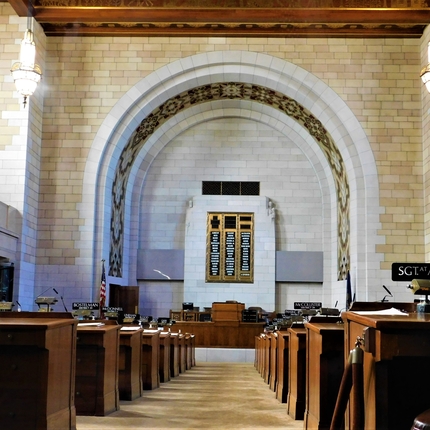By Jordan Rasmussen, former staff member
Elected representatives in Nebraska will debate a host of issues during the 2020 legislative session, including economic development, budget and tax, health care, energy and environment, and food and agriculture.
Relevant developments concerning priority legislation will be shared via email. Email [email protected] to sign up for updates.
Economic development
In 2019, we originated a bill to address broadband in rural areas. As of July, the Federal Communications Commission (FCC) began implementing a requirement to address this mapping deficit. This activity was complemented by our participation on the Rural Broadband Task Force.
The year was also marked by debate around the state’s business tax incentives, the ImagiNE Nebraska Act, which will continue into 2020. Ensuring rural business development was not overlooked, we advocated and helped pass a bill, which, beginning in 2021, redirects $4 million in underused funds to the Business Innovation Act, supporting business development in rural Nebraska.
In 2020, our efforts will continue to focus on rural broadband access and small business development. Legislation will be introduced by the Center to ensure the validation of broadband data and mapping collection. Technical assistance, targeted tax incentives, and microlending are proven strategies to boost rural economies, but it is becoming increasingly difficult to set aside funding exclusively for rural microbusinesses. Each will be a focal point of our advocacy efforts.
Energy and environment
Nebraska continues to develop renewable energy resources across the state, providing communities with clean energy while bringing new economic opportunities to rural areas. But, in 2019, several pieces of legislation aimed to limit local control over renewable energy development, such as strict siting requirements on wind energy and preempted local control over zoning for projects. Likely, we will see similar efforts in 2020.
We will support policy options that lead to economic development opportunities through renewable energy investment.
Health care
Following the success of the 2018 ballot initiative for Medicaid expansion, supporters anticipated that 2019 was the year in which 90,000 low-income Nebraskans would gain access to health care coverage. However, the year was spent advocating for a more expedient implementation and protection of Medicaid services.
We will continue to advocate for the implementation of Medicaid expansion, without additional barriers to access. Strong, rural centered advocacy, media, and grassroots outreach activities will be essential to this effort.
In parallel with this work, we will expand our advocacy for existing services, improved reimbursement rates, health care workforce development, and the stabilization of rural elder care facilities.
Budget and tax
Property tax is a top priority. Recognizing the impact of unpredictable revenues and unsustainable property taxes, the Center will advocate for new revenue streams to help meet the state’s obligations.
We will support bills that meaningfully address the property tax burden suffered by rural Nebraskans. We will defend against cuts to education and other social services important to underserved individuals and families.
Food and agriculture
The Center remains committed to the family farmer and opportunities to bring the next generation into farming while also reforming the tax system in a manner which lessens the tax burden for property owners and agriculturists.
Building on the momentum of our collaboration with the Nebraska Food Council, we will advocate for food policy that improves access to healthy, fresh, and affordable foods for rural residents. We will also advocate for policies that encourage conservation and the adoption of soil health practices, and provide farmers with greater protections from the misuse of chemicals.
Nebraska ranks in the top half of most obese states for children ages 10 to 17, high school students, and adults. The state is looking at a cost of nearly $487 million attributable to its 2017 childhood obesity rate for future health care costs and diminished productivity. Despite the state’s high levels of obesity among children, schools are not always built to allow for or encourage adequate consumption of water during the school day and school activities. In 2020, we will introduce legislation requiring new or expanded school facilities to install a minimum of one drinking fountain or water bottle filling station for every 75 students, along with proper maintenance.
Other issues in Nebraska
Adverse Possession – Nebraska law does not require that an adverse possessor prove payment of property tax to satisfy a claim. Nebraska law also does not make payment of property taxes an affirmative defense. In 2017, we initiated legislation to a) require that property tax be paid by the adverse possessor over the statutory period to satisfy an adverse possession claim and b) require that any adverse possessor compensate the original owner for any property tax paid during the statutory period. This bill will be carried over 2020.
What do you think?
Let us know your input on these priorities and tell us about other state issues that are important to you. Are you interested in writing a letter to your legislator or even testifying at the state capitol? Let us know.





